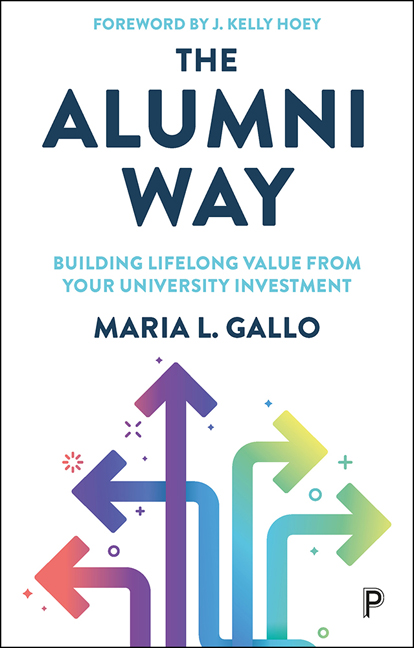Book contents
- Frontmatter
- Dedication
- Contents
- Acknowledgements
- Foreword
- Introduction: We are all alumni
- PART I Charting the course of the Alumni Way
- PART II The Alumni Way trait: Reflection
- PART III The Alumni Way trait: Curiosity
- PART IV The Alumni Way trait: Passion
- PART V The Alumni Way trait: Generosity
- PART VI Alumni: Bringing it into our lives
- Notes
- References
- About the author
- Index
1 - Starting at the finish line
Published online by Cambridge University Press: 13 May 2022
- Frontmatter
- Dedication
- Contents
- Acknowledgements
- Foreword
- Introduction: We are all alumni
- PART I Charting the course of the Alumni Way
- PART II The Alumni Way trait: Reflection
- PART III The Alumni Way trait: Curiosity
- PART IV The Alumni Way trait: Passion
- PART V The Alumni Way trait: Generosity
- PART VI Alumni: Bringing it into our lives
- Notes
- References
- About the author
- Index
Summary
At one stage in our lives, we were all there, stepping up to the podium to receive our diploma. Recent graduates only imagined this rite of passage, replaced with a virtual or physically distanced event. For still others, including myself, I crossed the stage and graduated with my undergraduate degree in the 1990s. This was a time when the internet was in its infancy, and social media non-existent. Times have certainly changed.
What hasn't changed is that the university wants us. As alumni, they appeal to us to keep in touch, get involved, and give back. They seek our alumni leadership. They describe ways we can contribute to the institution, fostering a place of learning and discovery for future students. Do we want the university? I believe the answer should be yes. Yes, to new and radical ways of thinking about our alumni network and our university. This book aims to support our journey as alumni and as leaders.
Our journey begins with graduation. Graduation changes our relationship with the university from a state of doing, to a state of being. As a student, this active state of doing was likely at a feverish pace: attending classes, writing exams, completing assignments, studying, reading, writing, thinking, researching (and of course socializing!). We met the academic requirements, performed impressive intellectual feats, and endured personal sacrifice. It ended with a single piece of paper: the degree. Graduation celebrates this impressive act of doing, allowing us to be swept up in the moment. Whether it was a massive formal gathering on campus, a virtual celebration, or a quiet parchment reveal at home, it remains the grand finale of our momentous achievement, closing our educational chapter.
Today, and over the days, months, or years following our success, we have a new static identity: we are alumni. Unlike our student identity that required energy and action, as alumni we are not required to do anything. Active or not, our alumni status doesn't change. We are alumni, no matter what. We are forever a member of our graduating class and the alumni community. This is our transition from doing to being. This book would end here if the state of being an alum were enough.
- Type
- Chapter
- Information
- The Alumni WayBuilding Lifelong Value from your University Investment, pp. 11 - 14Publisher: Bristol University PressPrint publication year: 2021

